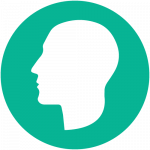Mental Health & Addiction
The DART
Building an Open-Access Diagnostic Tool: The DART
A staggering one in five Canadians will experience mental illness at some point during their lives, which can take a devastating toll on one’s quality of life, particularly when the initial diagnosis is delayed. Mental illness also creates a substantial economic burden associated with treatment and lost employment opportunities, which is estimated at $50 billion annually in Canada.
Faster, more reliable diagnoses can have a great impact on reducing personal and economic burdens by decreasing the latency between the onset of symptoms and the start of treatment. Many clinicians and researchers use interview tools to assess psychiatric symptoms and make diagnoses. Unfortunately, many of these tools are hindered by their limited diagnostic scope, insufficient psychometric data, lengthy administrations, and low reliability for some disorders. On top of that, trends towards pay-per-use models or volume licensing fees further limit accessibility.
To address this issue, a team of researchers and clinicians at St. Joseph’s Healthcare Hamilton and McMaster University have been developing an open-access, next generation diagnostic tool: the Diagnostic Assessment Research Tool, or DART.
The DART Working Group is led by Dr. Randi McCabe of the Anxiety Treatment and Research Clinic at St. Joe’s and the Department of Psychiatry and Behavioural Neurosciences at McMaster University. The work began in 2016 with the collaboration of psychologists across clinics at St. Joe’s. In 2019, McCabe and co-principal investigator, Dr. Elizabeth Pawluk, were awarded a project grant from the Canadian Institutes of Health Research to study the psychometric properties of the DART.
“When we first conceived of the DART, our goals were to develop a diagnostic tool that was free to use, easy to administer, and designed to minimize patient burden across both clinical and research settings” says Dr. McCabe.
Did you know?
While the exact number of diagnoses in the DSM-5 is debated, 157 is commonly suggested.
One of the major challenges to creating such a broad interview tool involves the sheer number of possible diagnoses. There are approximately 157 diagnoses listed in the fifth edition of the Diagnostic and Statistical Manual of Mental Disorders (DSM-5) alone – one of the main reference texts used by clinicians and researchers.
“We built the DART using a modular design. This allowed us to divide DSM-5 mental disorders among expert clinicians, who each wrote interview questions for specific modules,” says Dr. Pawluk. “This will also make it easier to add new diagnostic modules in the future, as the DART grows in scope.”
The current edition of the DART includes diagnostic modules for mood and anxiety disorders, obsessive compulsive and related disorders, trauma and stress-related disorders, addictive disorders, and much more.
In January 2022, a pilot validation study of the DART was published in the journal Psychological Assessment. It showed high rates of agreement between assessors using the new tool, demonstrating its consistency over other interview tools. In addition, the published findings on the DART Screener show that it is a reliable tool that can be used as a stand-alone screening measure or for guiding which DART modules to administer.
Mental Health & Addiction
Now, to increase accessibility for researchers and clinicians beyond St. Joe’s, the DART Working Group has prepared a French language translation that is undergoing pilot testing. The team is also working to implement a virtual version – a Digital DART – making it more user friendly for researchers and provide diagnostic summaries to clinicians.
The DART is currently being used in clinical and research setting across Canada, the United States, the United Kingdom, Australia, and Brazil.
“As we continue to expand the DART with added modules, we’re confident that researchers and clinicians will increasingly find it to be a valuable tool for effective assessment of mental health disorders,” says Dr. McCabe.


